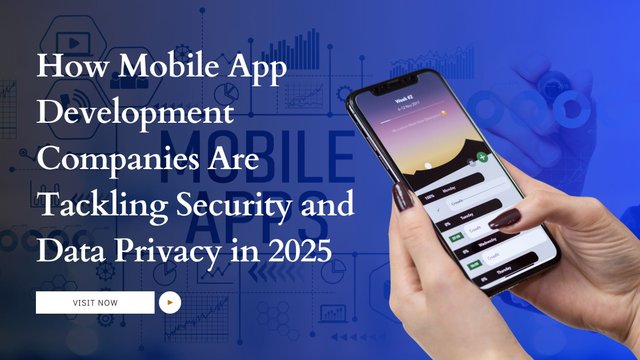How Mobile App Development Companies Are Tackling Security and Data Privacy in 2025
As the demand for mobile apps continues to surge in 2025, the challenges around security and data privacy are growing more complex. From banking and healthcare to e-commerce and logistics, mobile applications are now handling an enormous volume of sensitive data. Any breach can lead to major financial loss, reputational damage, and legal consequences.
To stay ahead, every responsible mobile app development company is taking data protection seriously—incorporating the latest technologies and privacy practices into the app development lifecycle. This shift is not just a trend but a necessity for survival in today’s digitally driven economy.
The Growing Risks in Mobile Application Development
Mobile applications are constantly exposed to security risks such as:
Unauthorised data access
Man-in-the-middle (MITM) attacks
Data leakage due to insecure storage
Weak encryption practices
Malware and third-party code injections
With stricter data regulations and growing user awareness, companies must ensure that their apps meet high standards of privacy and security. This is where a trusted custom mobile app development company plays a crucial role, making it essential to hire app developers who are skilled in building secure, compliant, and user-focused solutions.
How Mobile App Development Companies Are Addressing Security in 2025
1. Implementing Zero-Trust Architecture
A zero-trust model operates on the principle that no user or device is automatically trusted, regardless of their location or access level. Access is granted only after continuous verification, drastically reducing the risk of unauthorised entry.
Dynamic user authentication
Context-aware access controls
Identity verification at every step
2. End-to-End Data Encryption
Data is encrypted both at rest and in transit to ensure it cannot be intercepted or manipulated.
Use of AES-256 encryption for data storage
SSL/TLS for data transmission
Encrypted local storage and token-based access
3. Biometric and Multi-Factor Authentication (MFA)
To protect user accounts, biometric logins such as fingerprint or facial recognition are being used alongside MFA.
Reduced risk of password breaches
Enhanced user convenience and security
Integration with mobile hardware-level security
4. Secure API Development
APIs are the backbone of app integrations, but they can be vulnerable if not secured. Development companies are taking steps to protect APIs by:
Using API gateways for secure access
Encrypting API requests and responses
Limiting access with role-based tokens
5. Regular Code Audits and Penetration Testing
Top developers perform frequent code reviews and simulated attacks to identify vulnerabilities.
Static and dynamic security analysis
White-hat testing to simulate hacker attacks
Real-time monitoring of app performance and threats
6. Compliance with Global Data Regulations
A reliable mobile app development company ensures compliance with international standards such as
GDPR (EU)—for user data transparency and control
HIPAA (USA)—for healthcare apps handling patient data
DPDP (India)—India’s new data protection framework
Being compliant builds trust and prevents hefty legal penalties.
7. Minimal Data Collection & Usage Transparency
Modern apps now collect only necessary user data and clearly state how it’s being used.
Clear consent forms and opt-in options
In-app privacy dashboards for users
Anonymous usage tracking and data anonymisation
8. Securing Third-Party Libraries and SDKs
Mobile apps often rely on third-party services for features like analytics, payments, or ads. Developers now vet these tools strictly.
Use of verified SDKs from trusted vendors
Isolated sandboxes for third-party code
Continuous updates to patch known vulnerabilities
Why Custom Mobile App Development Companies Have the Edge
A custom mobile app development company goes beyond plug-and-play templates to design apps that meet the unique security and compliance needs of each business. This personalised approach enables:
Deep integration with industry-specific security standards
Custom-built encryption models and security layers
Scalable architecture that evolves with user needs
Faster incident response with dedicated support teams
Custom apps are also more flexible when it comes to adapting to new compliance rules or integrating future privacy-enhancing technologies.
Future Trends in Mobile App Security
In 2025 and beyond, security is not an afterthought—it is built into every phase of app development. Emerging technologies being explored include:
AI-driven threat detection
Blockchain for data integrity and auditability
Privacy-enhancing computation techniques
Secure edge computing for IoT apps
Mobile app development is becoming more proactive, with security features evolving in real-time based on user behaviour, network conditions, and emerging threats.
Conclusion
As a leading custom mobile app development company, Arobit Business Solution ensures that security and privacy are embedded into every solution it delivers. With over 500 clients served and deep expertise in mobile app architecture, Arobit follows the best practices in secure coding, data protection, and compliance.
Whether it's a financial app with sensitive transactions, a healthcare solution with patient data, or a startup MVP with customer onboarding—Arobit offers end-to-end solutions that are reliable, scalable, and secure.
By continuously upgrading its tech stack, adhering to international data standards, and integrating modern cybersecurity protocols, Arobit is helping businesses build trust and thrive in a digital-first world.
.jpg)